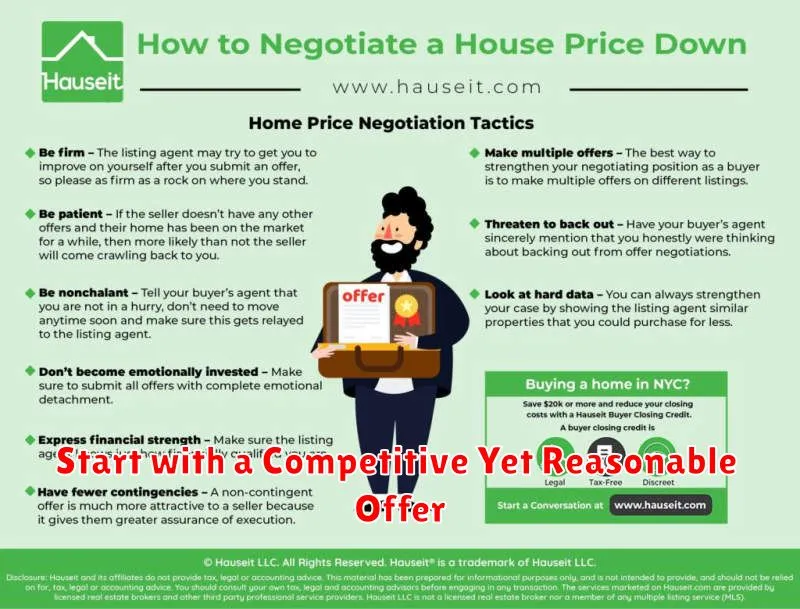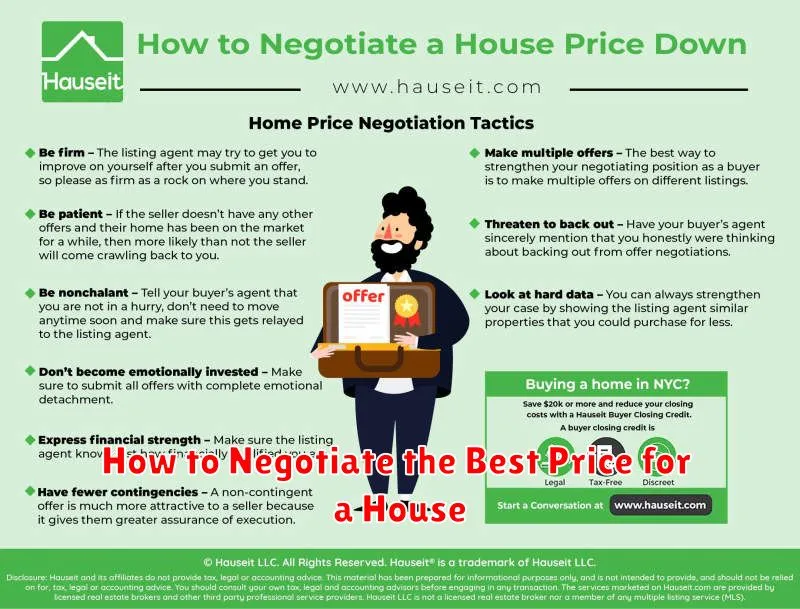Buying a house is likely the largest purchase you’ll ever make. Securing the best price is paramount to protecting your financial future and ensuring you don’t overpay. This article, “How to Negotiate the Best Price for a House,” will provide expert advice and practical tips on navigating the complexities of real estate negotiations. Whether you’re a first-time homebuyer or a seasoned investor, learning how to effectively negotiate can save you thousands of dollars and put you in the best possible position to purchase your dream home.
From understanding market value and making a strong offer to negotiating repairs and closing costs, this comprehensive guide will cover all aspects of the house buying negotiation process. We’ll delve into strategies for working with real estate agents, interpreting seller motivations, and ultimately, securing the best price possible. Learn how to negotiate like a pro and confidently navigate the path to homeownership, armed with the knowledge you need to succeed in today’s competitive real estate market.
Research Comparable Sales in the Area
When determining the fair market value of a property, researching comparable sales, often called “comps,” is essential. Comps are recently sold properties similar to the subject property in terms of location, size, age, condition, and features. Analyzing these sales provides a strong foundation for understanding the current market and establishing a realistic price. Focus on properties sold within the past six months, ideally within a one-mile radius. The closer the comps are in characteristics and proximity, the more accurate the valuation will be.
Key factors to consider when evaluating comps include the sale price, date of sale, square footage, lot size, number of bedrooms and bathrooms, and any significant upgrades or renovations. Adjustments should be made to account for differences between the comps and the subject property. For example, if a comp has a finished basement and the subject property does not, the value of the finished basement should be subtracted from the comp’s sale price to provide a more accurate comparison.
Accessing comparable sales data can be done through various methods. Real estate agents have access to the Multiple Listing Service (MLS), a comprehensive database of property information. Online real estate portals can also provide sales data, although the information may be less detailed. Public records at the county assessor’s office can also be a valuable resource. By thoroughly researching comparable sales and making appropriate adjustments, a well-informed and accurate estimate of a property’s value can be achieved.
Understand the Seller’s Motivation
Understanding a seller’s motivation is crucial in any negotiation, particularly in real estate or business acquisitions. Knowing why they are selling can provide valuable leverage and insight into their potential willingness to compromise. Are they relocating? Facing financial hardship? Looking to liquidate assets quickly? These factors can significantly impact their negotiating position and openness to different offer structures.
Identifying the seller’s motivation often requires careful observation and questioning. Look for clues in their language, body language, and the urgency they convey. Direct questions about their reasons for selling can be insightful, but also approach the topic indirectly by asking about their future plans or overall goals. Gathering information from third parties, such as mutual acquaintances or industry contacts, can also provide a valuable perspective on the seller’s underlying motivation.
Once you have a clearer understanding of their motivations, you can tailor your offer to better address their specific needs. For example, a seller facing financial difficulties might prioritize a quick closing, even at a slightly lower price. A seller relocating might appreciate flexibility in the closing date. By aligning your offer with their primary motivation, you increase the likelihood of a successful negotiation and a mutually beneficial outcome.
Start with a Competitive Yet Reasonable Offer

Initiating the negotiation process with a strong and realistic offer is crucial. A competitive offer demonstrates seriousness and respect for the seller’s time, while a reasonable offer acknowledges market value and avoids alienating the other party. Research comparable properties and recent sales data to determine a fair price range. Consider factors like location, condition, and amenities to fine-tune your initial offer. Presenting a well-informed offer can set a positive tone for the entire negotiation.
While aiming high can be tempting, an excessively low offer can be counterproductive. It may be perceived as disrespectful and could lead the seller to dismiss your interest entirely. Conversely, offering too much at the outset can limit your negotiating power later. Strive for a balance between demonstrating your commitment and leaving room for potential concessions. This strategic approach allows for flexibility and increases the likelihood of reaching a mutually agreeable outcome.
Before making your offer, secure pre-approval for financing if necessary. This not only strengthens your position but also reassures the seller of your ability to complete the transaction. Having your finances in order demonstrates preparedness and can give you a competitive edge. A pre-approval letter adds credibility to your offer and can expedite the closing process once an agreement is reached.
Use Inspection Results to Your Advantage

Inspection results provide critical insights into the condition of an asset, process, or system. These insights, whether positive or negative, are valuable tools for improvement. Thorough analysis of findings can identify areas of strength to be leveraged and weaknesses to be addressed. This applies to various contexts, from manufacturing and construction to safety and quality control. Effectively using inspection results facilitates informed decision-making, resource allocation, and proactive problem-solving.
Understanding the implications of inspection findings is crucial for translating data into action. This involves considering the severity and potential impact of identified issues, prioritizing corrective measures, and allocating resources accordingly. For example, a critical safety violation requires immediate attention, while a minor procedural discrepancy might warrant a less urgent response. By evaluating the findings within a broader context, organizations can make strategic choices that optimize performance and minimize risk.
Regularly reviewing inspection results enables organizations to track trends, identify patterns, and evaluate the effectiveness of implemented solutions. This continuous improvement approach ensures that issues are not only addressed but also prevented from recurring. Monitoring the impact of corrective actions allows for further refinement and adaptation, leading to more robust and reliable systems over time.
Be Ready to Walk Away

One of the most powerful negotiating tactics is the willingness to walk away. When you’re not emotionally invested in the outcome, you can make clear-headed decisions and avoid accepting a deal that isn’t in your best interest. Whether negotiating a salary, the price of a car, or the terms of a contract, being prepared to walk away gives you leverage and puts you in a stronger position.
Knowing your bottom line is crucial. Before entering any negotiation, understand your minimum acceptable terms. This clarity allows you to recognize when a deal is no longer worthwhile and to confidently walk away. It prevents you from getting caught up in the moment and making concessions you’ll later regret.
Walking away doesn’t necessarily mean the negotiation is over. It can signal to the other party that you’re serious and not willing to settle for less than you deserve. This can sometimes lead to a more favorable offer. Remember, being prepared to walk away isn’t about being aggressive, it’s about knowing your worth and being willing to stand up for it.
Work Closely with Your Agent
Communication is key to a successful real estate transaction. Work closely with your agent, keeping them informed of your needs, preferences, and any changes in your situation. Provide feedback after showings and be responsive to their calls and emails. This open line of communication ensures your agent can effectively advocate for you and find the perfect property or buyer.
Your agent is a valuable resource with extensive market knowledge and expertise. Lean on their advice regarding pricing, negotiations, and the overall process. They can help you navigate complex paperwork, understand market trends, and ultimately make informed decisions. Ask questions and don’t hesitate to seek clarification on any aspect of the transaction.
By fostering a strong working relationship with your agent, you’ll create a smoother, more efficient, and ultimately more successful real estate experience. Their expertise and guidance, combined with your active participation, will help you achieve your real estate goals.
Avoid Common Negotiation Pitfalls
Negotiations, whether for a salary, a business deal, or even everyday life situations, can be tricky. One common pitfall is inadequate preparation. Thoroughly researching the other party’s needs and potential positions can significantly improve your outcomes. Knowing your own bottom line and having a clear understanding of your desired outcome is equally crucial. Failure to adequately prepare often leads to accepting unfavorable terms or missing opportunities for mutual gain.
Another common mistake is becoming emotionally invested. While passion can be beneficial, letting emotions cloud your judgment can derail the entire process. Avoid taking things personally and focus on objective facts and figures. Maintaining a professional demeanor and keeping your cool under pressure will allow you to make rational decisions and secure the best possible outcome. Remember, the goal is to reach a mutually beneficial agreement, not to win an argument.
Finally, failing to listen actively can hinder successful negotiation. Truly understanding the other party’s perspective is vital. Pay attention not only to what they say, but also to their body language and nonverbal cues. Asking clarifying questions and actively listening demonstrates respect and fosters a collaborative environment. By understanding their needs and concerns, you can tailor your approach and find creative solutions that address everyone’s interests.

